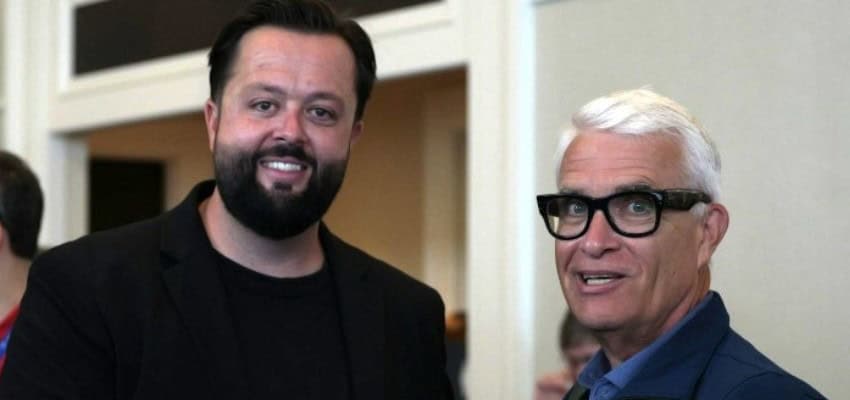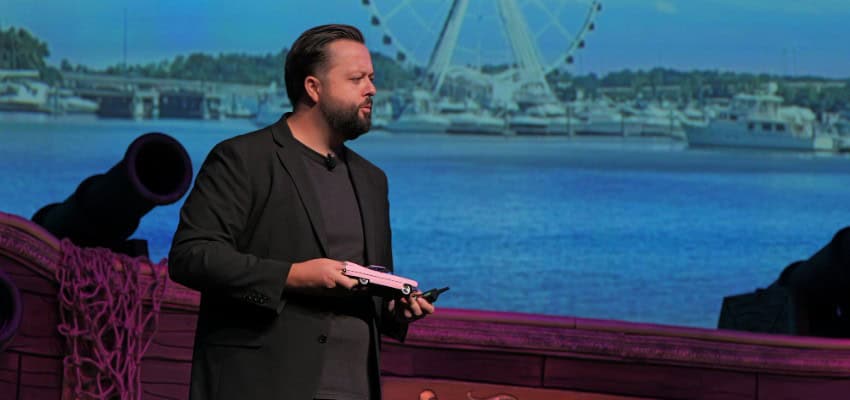Editor’s Note: Opening ILTACON 2025 in National Harbor, keynote speaker Ryan Campbell set aside the expected talk of AI advancements and cybersecurity frameworks to deliver something far more personal — a challenge to rediscover joy. In a room filled with legal technologists, eDiscovery specialists, and governance professionals, Campbell’s journey from record-breaking pilot to crash survivor, and ultimately to resilience advocate, offered a rare pause in an industry defined by relentless pace and precision. His message — to identify and protect your “pink Cadillac,” the moments and pursuits that ignite genuine happiness — resonates deeply in a field where burnout statistics are climbing and innovation depends on human creativity as much as technological capability. For professionals navigating the constant change of legal technology, this wasn’t just an inspiring story; it was a reminder that resilience and well-being are strategic imperatives.
Content Assessment: What's Your Pink Cadillac? A Morning of Joy and Resilience at ILTACON 2025
Information - 94%
Insight - 95%
Relevance - 93%
Objectivity - 96%
Authority - 97%
95%
Excellent
A short percentage-based assessment of the qualitative benefit expressed as a percentage of positive reception of the recent article from ComplexDiscovery OÜ titled, "What's Your Pink Cadillac? A Morning of Joy and Resilience at ILTACON 2025."
Industry News – Technology Beat
What’s Your Pink Cadillac? A Morning of Joy and Resilience at ILTACON 2025
ComplexDiscovery Staff
NATIONAL HARBOR, Md. — The ballroom was already humming when the lights dipped, the kind of low electric buzz that comes from thousands of conversations happening at once. The screen above the stage glowed with ILTACON’s signature graphics, and the rows of chairs stretched so far back that the faces blurred into a mosaic of anticipation.
ILTACON is not just another industry conference. Hosted by the International Legal Technology Association, it is the largest annual gathering of legal technologists, bringing together law firm leaders, corporate legal operations professionals, technology vendors, consultants, and innovators from around the world. For 45 years, it has served as a hub for sharing expertise, networking, and exploring the tools and strategies that shape the business and practice of law. This year, more than 4,400 participants are expected to fill the Gaylord National Resort & Convention Center, making it one of the biggest ILTACON annual meetings in history.
Attendees came prepared for sessions on governance, cybersecurity, artificial intelligence, and the changing nature of legal service delivery. But the opening keynote took a surprising turn — away from software, data, and compliance — and into the territory of personal resilience and joy.

When Ryan Campbell walked onto the stage, he smiled as if he were stepping into a room full of old friends. Unmistakably Australian, he took in the sight of a crowd that had come from every corner of the legal technology world. He began not with a statistic or a slide, but with a story.
In his lilting Australian cadence, Campbell described the boy he once was: a teenager with a paper route and a dream that seemed impossible — to fly solo around the world in a single-engine aircraft before he turned twenty. He told of washing dishes alongside his father, trying to summon the courage to ask if his parents would support the idea. They said yes, not fully understanding the scale of what he was proposing. Over the next two years, he raised a quarter of a million dollars, trained for extreme conditions, and prepared a plane to make the 24,000-mile journey.
The audience followed him into the cockpit, over the wide and dangerous expanse of the Pacific, through the heart-pounding moments when storms rose like walls in his path, and into the icy air over Greenland. They laughed at his description of the world’s smallest airports and the awkward interviews with international media. They could picture the moment he landed back at the same small airport just south of Sydney, where he had taken off 70 days earlier, crowds gathered to see the youngest pilot ever to complete the feat.
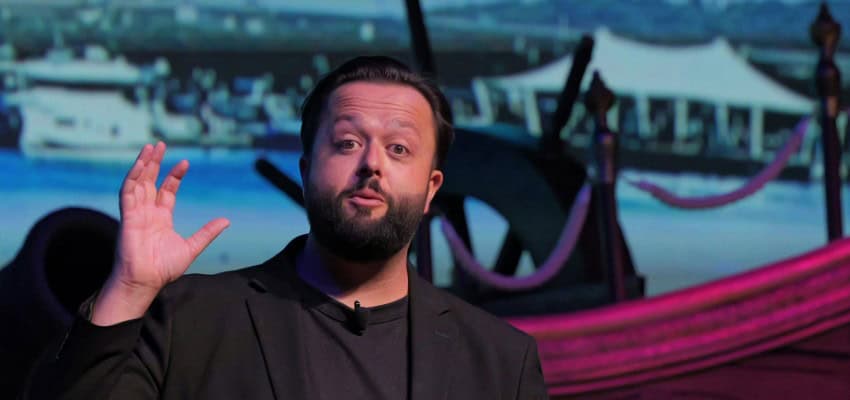
But the triumph was not the whole story. Campbell’s voice shifted, softer now, as he told of the day, two years later, when a vintage biplane’s engine failed shortly after takeoff. There was a fire. The nose pitched down. He woke in a hospital with his body broken in multiple places, unable to move from the waist down. Doctors told him he might never walk again.
Here, the story slowed, bridging the gap between crisis and recovery. Campbell described the months that followed: the sterile white walls of the spinal rehabilitation ward, the mechanical hum of beds, the wheelchairs lined up for morning therapy. He painted the scene where he met Ben, a young quadriplegic whose accident had left him with almost no movement in his body. One day, as Campbell lay frustrated on a therapy bed, he caught Ben’s gaze. No words were exchanged, but in that silence, Campbell understood what Ben would give for one chance to attempt the exercise Campbell was struggling through. That moment reframed everything. He was not the only one enduring hardship, and perhaps, in some ways, he was lucky.
Years later, after partial recovery and a return to flying, Campbell moved to the United States. On a whim, he bought a 1960 pink Cadillac — a towering, chrome-finned relic he named Flo. He grinned as he told the ILTACON crowd about driving the nineteen-foot-long car home, breaking down five times along the way, and finally parking it proudly in his driveway. Flo became his Sunday cruiser, a curiosity that drew waves, selfies, and shouts from strangers.
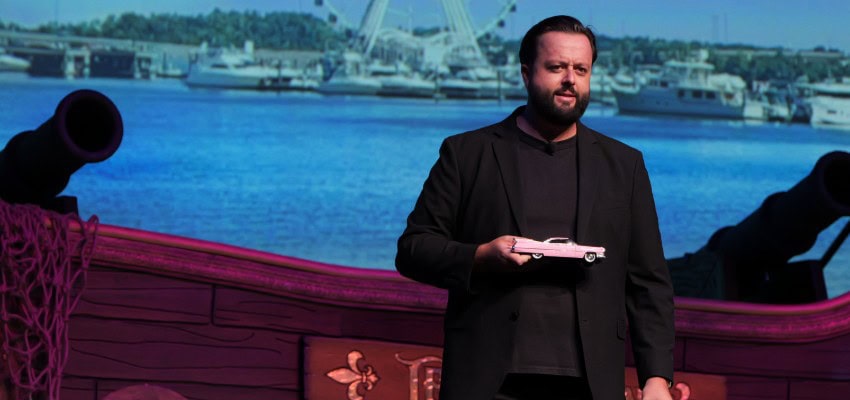
One afternoon, at a gas station, Campbell noticed an elderly man standing still, groceries in hand, staring at the car. The man’s face cracked into a smile so pure it seemed to erase years from his features. In that instant, Campbell saw what joy looked like when it broke through the noise of daily life — and he recognized how long he had been searching for that same feeling.
That, he said, is when the question was born: “What’s your pink Cadillac?” It’s a way of asking what lights you up, whether it’s a hobby, an interest, or a simple pleasure — and whether you give yourself permission to make space for it.
The story might have ended there, but Campbell widened the lens. He gave the audience a sobering snapshot of the modern workplace: in a survey of 14,000 people across 12 countries, 45 percent said they hadn’t felt true happiness in more than two years, and one in four had forgotten what it felt like entirely. Seventy percent of employees reported being affected by burnout, while 36 percent of organizations admitted they had no strategy to address it.
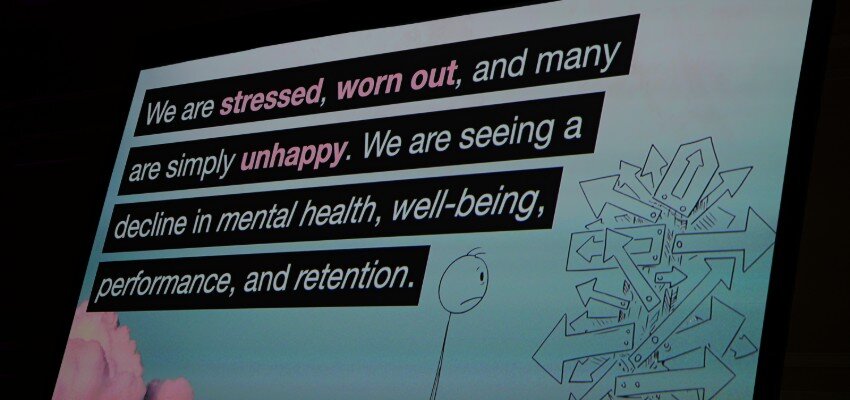
His answer is what he calls the Joy Audit, and here he lets the pacing stretch to match the gravity of the idea. First comes the quiet moment of assessment — taking stock of what truly brings you joy and how often it appears in your life today. Then comes understanding, digging into why those moments matter and the emotions they generate. From there, you design your days to make space for them, you implement those plans with intention, and finally, you tether joy into daily life so it is no longer a rare indulgence but a regular practice.
The room was still as Campbell explained that joy is not just about the activity itself, but about the fuel it provides: peace, connection, creativity, rest. He urged attendees to place those moments on the same level of importance as a meeting with a major client. “Because when you do,” he said, “you don’t just feel better. You show up better.”
Then he did something unusual for a keynote speaker. He invited everyone to take action before they even left the conference center. Outside the ballroom, boards stood ready with markers. He asked each person to write down their own pink Cadillac and the feeling it gave them. Throughout the day, the boards filled with ink: the smell of coffee in the morning, hiking a mountain trail, making homemade pasta, playing the guitar, dancing in the kitchen. Attendees lingered, reading each other’s notes, sometimes laughing, sometimes nodding in quiet recognition.
As Campbell stepped off the stage, the applause was warm and sustained. People stood not just because the story was moving, but because it had left them with something tangible to carry forward — a reminder that in the middle of deadlines, tech rollouts, and client demands, there must be space for the things that make us feel most alive.
In the days ahead, ILTACON will return to its usual rhythm — the sessions on artificial intelligence, the debates on governance, the late-night conversations in hotel bars about the future of legal service delivery. But on that first morning at National Harbor, before the industry’s biggest conversations began, Ryan Campbell asked a room full of legal technologists to pause. To think. To remember that their greatest tool for resilience might not be in their tech stack at all, but in the quiet, joyful moments they choose to protect.
News Sources
- Campbell, Ryan. 2025. What’s Your Pink Cadillac? The Transformational Power of Prioritizing Joy. Presentation transcript, ILTACON, National Harbor, MD.
- ILTACON
- Ryan Campbell
- ILTACON 2025 Keynotes (ILTACON)
Assisted by GAI and LLM Technologies
Additional Reading
- Managing Emerging Data in eDiscovery: Lessons from LegalTechTalk 2025
- What UK Law Firms Really Want: Procurement Insights from LegalTechTalk 2025
- The O2’s Transformation Sets the Stage for LegalTechTalk 2025
- HaystackID® Elevates Legal Tech Strategy Across Europe with Case Insight™ and CoreFlex™ (HaystackID)
Source: ComplexDiscovery OÜ
